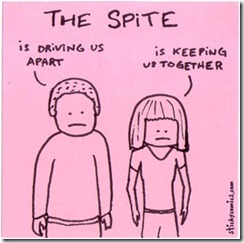I’m not spiteful. I’m “aggressively moralistic.”
/For a long time, I have claimed that spite is one of the best reasons to do anything.
I’ve cited examples in which authors and scientists have used spite to motivate them to great achievements.
I’ve written about how spite is one of my 5 primary motivating factors in life.
I’ve argued that spite is one of three possible steps to happiness in your professional life.
I’ve even written about how a positive attitude can be utilized in the pursuit of spite.
Then I listened to the most recent episode of the Freakonomics podcast, which addressed the economics of spite, and it turns out that I am not spiteful after all.
Spite, by definition, requires a person to actively harm him or herself in the pursuit of harming another.
When I told a friend about this definition, he said, “Oh no. You’d never harm yourself for anyone. You’re far too selfish for that.”
He’s right.
Instead, it turns out that I am aggressively moralistic, a state in which I am willing to bring harm to those I feel are deserving while receiving no discernible or tangible benefit in the process.
From an economist’s view, aggressively moralistic is a more sensible position than spite simply because it does not come with any cost except for time and effort.
It is still an economically unwise decision according to economists, because effort and time spent absent of reward is not economically sound, but not nearly as foolish or personally damaging as spite.
I would argue, however, that economists are disregarding the value of personal satisfaction and the potential joy associated with metering out justice, delivering a deserving bit of comeuppance or being able to say the four best words in the English language:
These may not be the rewards that economists value, but for me, there are few things that I enjoy more.
